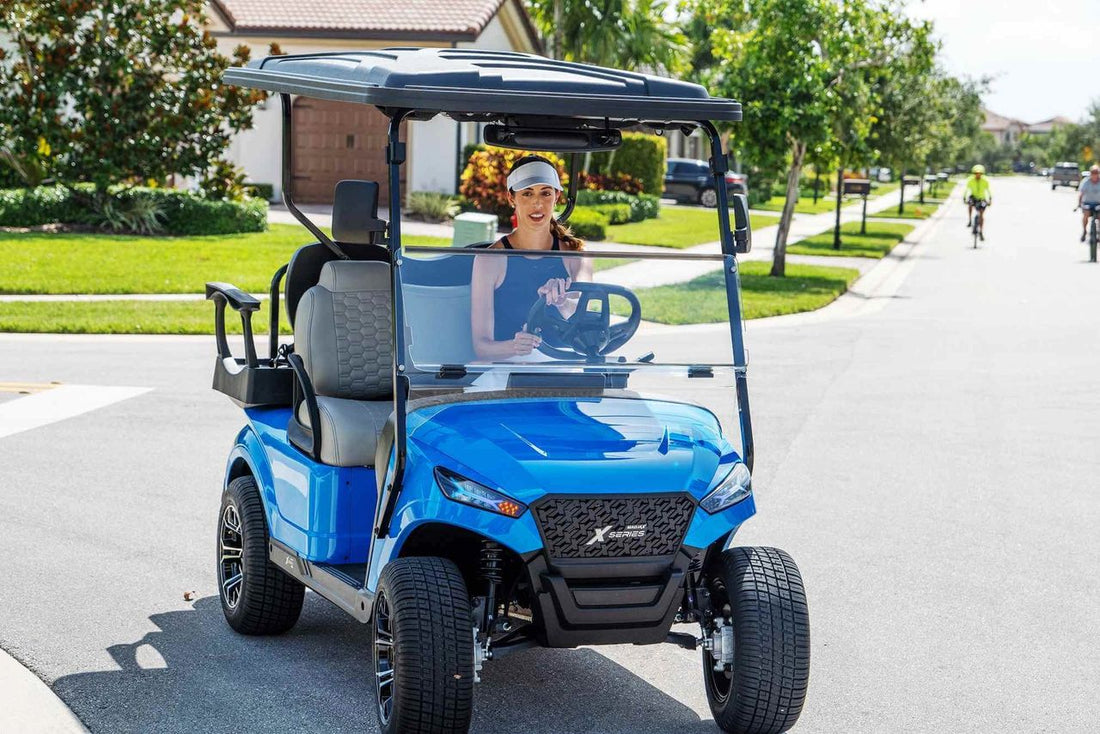
Street Legal Golf Carts: A Fun and Eco-Friendly Way to Get Around
Share
Let's Explore Florida's Roads with Golf Carts!
Welcome to the Sunshine State, where the weather is perfect for outdoor activities all year round. Lately, street legal golf carts have become a popular and eco-conscious way to cruise around town. Florida is all in on this trend, allowing golf carts to hit the road legally. In this post, we'll dive into the details of street legal golf carts, chat about the differences between various vehicle types, and cover the insurance requirements, especially here in Florida.
Low Speed Vehicles (LSVs)
First up, Low Speed Vehicles, or LSVs. These are the four-wheel wonders that can go faster than 20 miles per hour but not more than 25 miles per hour. In Florida, they need to be registered, titled, and insured with personal injury protection (PIP) and property damage liability (PDL) insurance. And hey, if you're driving one, make sure you've got your driver's license handy.
LSVs stick to streets with speed limits of 35 MPH or less and come with safety features like headlamps, turn signals, and the whole shebang. To get your LSV officially on the road, you'll need documents like the Manufacturer's Certificate of Origin, Form HSMV 82040 (Application for Title), proof of Florida insurance, and your trusty ID. Oh, and don't forget those fees—title fee, plate fee, and whatever else might pop up.

Now, let's talk about the OGs of easy cruising—golf carts. Designed for golf courses but sneaking onto the streets, these babies usually max out at 20 miles per hour. You might spot them on roads posted at 30 MPH or less. Plus, they can sneak across a county road if it intersects a golf cart-approved area, a golf course, or a mobile home park. Just keep an eye out for signs saying golf carts rule the road. No license needed, but if you're hitting the public road at 14 or older, you're good to go.
And guess what? No paperwork hassle. Golf carts don't need to be titled or registered. Insurance? Nah, not for these laid-back rides. It's like the ultimate exemption card—golf cart style.
Converted Golf Carts

Now, for the adventurers looking for a bit of both worlds—converted golf carts. You can turn your golf cart into an LSV (like the speedy ones we talked about earlier). But here's the thing, if you make the switch, your registration and title won't show the original manufacture date. It'll be all about when it got its street cred.
Before you roll out with your souped-up golf cart, a trip to the Motorist Services Regional Office is in order. Bring those before-and-after pics, complete Form HSMV 84490 (Statement of Builder), and get ready for the paperwork party. There's an affidavit, bills of sale, weight slips, application forms, and, of course, proof of Florida insurance. And don't forget the fees—inspection, title, plate, registration—gotta cover all the bases.
Insurance Requirements in Florida
Now, let's talk about the serious stuff—insurance. While regular golf carts get a free pass, LSVs and converted golf carts need to be covered. It's like a safety net for bumps, scrapes, and everything in between. Personal injury protection (PIP) and property damage liability (PDL) are the names of the game, with a minimum coverage of $10,000 each.
Why? Well, it's Florida making sure everyone stays safe on the road. It's like a little peace of mind for your joyrides.
